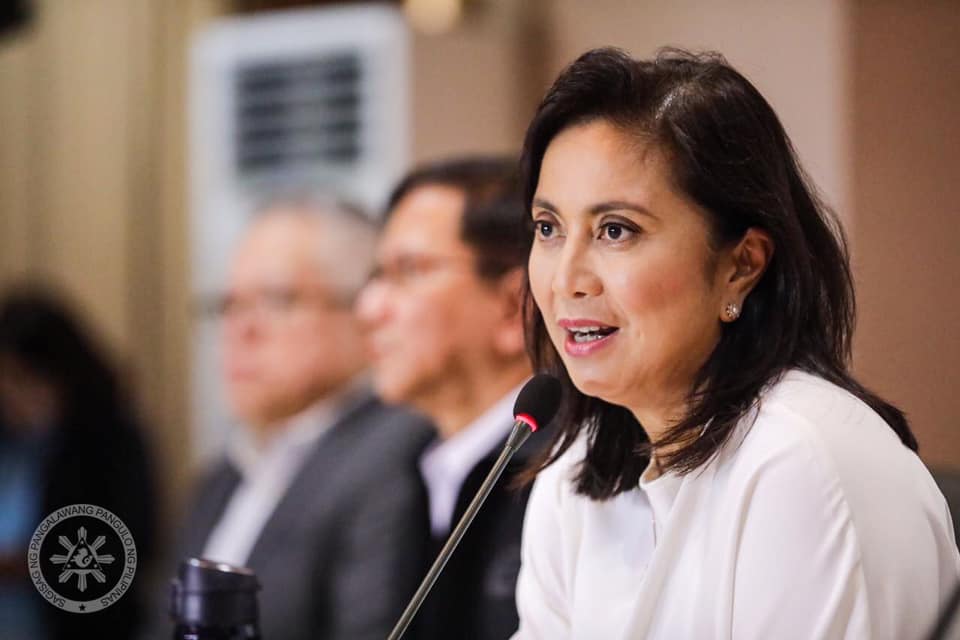
MANILA — Vice President Leni Robredo’s “backers” must not intervene, as she performs her duties as co-chair of the Inter-Agency Committee on Anti-Illegal Drugs (ICAD), Malacañang said on Saturday.
“The Vice President must be given a wide latitude in outlining her own anti-illegal drug scheme and pursue, without interference from other quarter backers, her own agenda, which she envisions to be effective in addressing the drug menace,” Presidential Spokesperson Salvador Panelo said in a statement.
Robredo held her first meeting with ICAD member agencies at her office in New Manila, Quezon City on Friday afternoon, two days after she accepted President Rodrigo R. Duterte’s challenge to lead the anti-narcotics campaign by serving as co-chair of the anti-drug body.
She will serve as ICAD co-chairperson, along with Philippine Drug Enforcement Agency (PDEA) Director General Aaron Aquino, until June 30, 2022.
After her first ICAD meeting, Robredo set the tone for an evidence-based approach to the drug problem, which she said would prevent “senseless” killings in the conduct of operations against drug personalities.
While she emphasized that the drug problem in the country “should first be solved internally,” Robredo was amenable to a possible intervention of the United Nations Human Rights Council (UNHRC), if the Philippine government fails to punish drug offenders.
The 47-man UNHRC on July 11 adopted the Iceland-led resolution that seeks a probe into Duterte’s war on illegal drugs. The adoption of the resolution mandates UN rights chief Michelle Bachelet to present a “comprehensive” report on the drug war in the Philippines during the council’s 44th session in June 2020.
On July 17, the President made it clear that he would ignore the investigation that would be initiated by the UNHRC, as he is only inclined to face a “Philippine court.”
“We take note that the Vice President called for the meeting to acquaint herself on the status of the government’s campaign against illegal drugs, a step demonstrative of her willingness to suspend all her negative notions about the drug war, mostly based on false, if not exaggerated, information and media hype,” Panelo said.
He urged the public, especially those who are opposed to the government’s campaign against illegal drugs, to refrain from creating “roadblocks and imagined conflicts” that may sow discord between Robredo and the ICAD members.
“We call on everybody to give VP Leni space, allow her to perform her assigned task and not to create roadblocks and imagined conflicts, pitting her against her fellow workers of government by way of intrigues, as well as wild and off-tangent speculations engineered by the usual suspects,” Panelo said.
No Duterte order for ‘bloody’ drug war
About 5,779 drug personalities died in legitimate police anti-drug operations from July 1, 2016 to Aug. 31, 2019, based on data released by the Philippine National Police (PNP) on November 6.
Despite the drug-related killings, Panelo said the President did not order a “bloody” war against drug suspects.
“In that meeting, VP Leni stressed that the campaign against illegal narcotics can succeed even without bloodshed,” he said. “Noting that the pronounced policy of the Drug Czar appears to be in direct contrast of what they wrongly perceive to be the bloody strategy of PRRD, the detractors and nitpickers pounce on the apparent strategic contradiction and have raised the specter of, even this early, a collision between the appointee and the appointing power.”
The PNP and the PDEA have assured Robredo that the government’s anti-drug operations would be conducted within the bounds of the law.
Aquino has asked Robredo to join actual operations against illegal drugs for a better understanding of the anti-narcotics drive.
Robredo accepted the offer, saying that she would like to see the real drug situation in the country.
Panelo said the Palace is “pleased” with Robredo’s openness to joining any operation by the PDEA or the PNP against drug lords and pushers, “without putting her life in peril.”
“She may see the hostile and mortal realities on the ground that could pave the way for the reassessment of her previous adversarial position on the government’s relentless drive against prohibited drugs or her adoption of better and effective measures not heretofore done,” he said.
Solve problems internally
After her meeting with the ICAD, Robredo said she believes the Philippines should initially be given a chance to solve its illegal drug problems internally.
“I have said this time and again that I feel that our problem should first be solved internally. If I was already of the impression after going around, after meeting with the different clusters, after having all the information that I need to have, if I believe that the government is not doing anything to punish whoever needs to be punished or to put to justice whatever needs to be put to justice, then I don’t have any problems with inviting them over,” she said when asked by a reporter regarding her position in letting the UN conduct a review on the country’s situation with regards to its anti-illegal drug campaign.
Meanwhile, Robredo said her meeting with the ICAD as its new co-chair has updated her on what relevant agencies have been implementing to stop the proliferation of drugs, during which the Philippine Anti-Illegal Drugs Strategy (PADS) was also discussed.
While the initial meeting was only intended to brief the vice president, Robredo said she proposed the addition of two success indicators in the PADS – the monitoring of the surrenderers and the progress of those who have undergone rehabilitation.